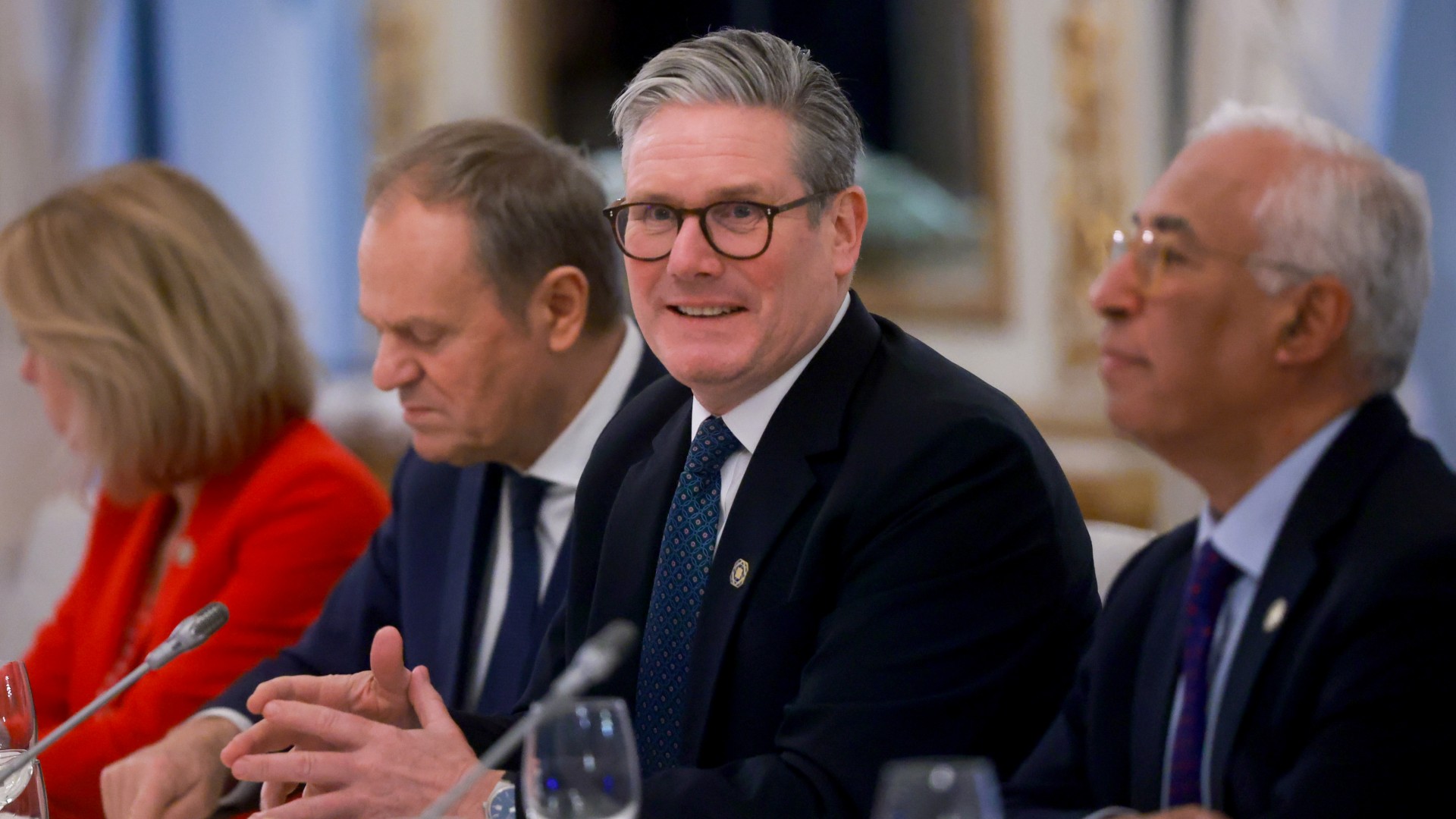Will Keir Starmer have to choose between the EU and the US?
Starmer's 'reset' with the EU will focus on 'defence for trade' but an 'EU-hating' president in the White House could cause the PM trouble

A free daily email with the biggest news stories of the day – and the best features from TheWeek.com
You are now subscribed
Your newsletter sign-up was successful
Keir Starmer's invitation to dinner in Brussels this week was "a big moment", said The Guardian, marking the first informal UK-EU summit since Brexit.
Five years after leaving the bloc, Labour is "far more sympathetic" to Europe than its Conservative predecessors, and closer EU ties could be the key to reviving the UK's "sluggish" economic growth.
But on the world stage Starmer is walking a "tricky tightrope" between Brussels and Washington. Donald Trump has threatened the EU with tariffs after imposing them on China at the weekend.
The Week
Escape your echo chamber. Get the facts behind the news, plus analysis from multiple perspectives.

Sign up for The Week's Free Newsletters
From our morning news briefing to a weekly Good News Newsletter, get the best of The Week delivered directly to your inbox.
From our morning news briefing to a weekly Good News Newsletter, get the best of The Week delivered directly to your inbox.
What did the commentators say?
There has been an ongoing "good vibes schtick" between the UK and the EU, and the UK and the US, said the BBC's Chris Mason. But Starmer, a former Remain campaigner, now has "choices – or dilemmas" – on whether to lean towards Brussels or Washington. The PM insists it's not an "either/or", but under a "Brexit-loving, EU-hating" Trump, "something is likely to have to give".
Starmer is using his reputation for "ruthless pragmatism" to make "steady (if slow) progress in forging a genuinely new relationship with Europe", said The Independent.
The emerging "Starmer reset" is about offering "defence for trade", framing the UK not as a "demandeur" of Brexit renegotiation but as a partner in a security-driven EU-UK relationship. Encouragingly, Europe seems "receptive".
Yet there remains a "plodding cautiousness" in Starmer's approach; he should be "bolder", said The Economist. He still clings to Labour's red lines: no single market, no customs union and no free movement, when he could "gain the upper hand by reframing Britain's EU debate in terms of hard geopolitical interest".
A free daily email with the biggest news stories of the day – and the best features from TheWeek.com
But with Europe facing political and economic challenges, "why would Sir Keir handcuff the UK to a failing bloc?", asked The Telegraph. It is UK interests that "should matter most".
What next?
For Starmer, perhaps the best tactic is "to deny there is a choice to be made" between Trump and the EU, "pursue parallel trade talks, and delay these decisions as long as possible", said Ian Dunt for The i Paper.
"Trump is madness" and the PM's focus should be all about managing that madness. "It is not inspiring. Of course it isn’t. But it is probably the only viable avenue open to him."
Sorcha Bradley is a writer at The Week and a regular on “The Week Unwrapped” podcast. She worked at The Week magazine for a year and a half before taking up her current role with the digital team, where she mostly covers UK current affairs and politics. Before joining The Week, Sorcha worked at slow-news start-up Tortoise Media. She has also written for Sky News, The Sunday Times, the London Evening Standard and Grazia magazine, among other publications. She has a master’s in newspaper journalism from City, University of London, where she specialised in political journalism.
-
 Will increasing tensions with Iran boil over into war?
Will increasing tensions with Iran boil over into war?Today’s Big Question President Donald Trump has recently been threatening the country
-
 Corruption: The spy sheikh and the president
Corruption: The spy sheikh and the presidentFeature Trump is at the center of another scandal
-
 Putin’s shadow war
Putin’s shadow warFeature The Kremlin is waging a campaign of sabotage and subversion against Ukraine’s allies in the West
-
 Kurt Olsen: Trump’s ‘Stop the Steal’ lawyer playing a major White House role
Kurt Olsen: Trump’s ‘Stop the Steal’ lawyer playing a major White House roleIn the Spotlight Olsen reportedly has access to significant US intelligence
-
 Trump’s EPA kills legal basis for federal climate policy
Trump’s EPA kills legal basis for federal climate policySpeed Read The government’s authority to regulate several planet-warming pollutants has been repealed
-
 House votes to end Trump’s Canada tariffs
House votes to end Trump’s Canada tariffsSpeed Read Six Republicans joined with Democrats to repeal the president’s tariffs
-
 Bondi, Democrats clash over Epstein in hearing
Bondi, Democrats clash over Epstein in hearingSpeed Read Attorney General Pam Bondi ignored survivors of convicted sex offender Jeffrey Epstein and demanded that Democrats apologize to Trump
-
 Judge blocks Trump suit for Michigan voter rolls
Judge blocks Trump suit for Michigan voter rollsSpeed Read A Trump-appointed federal judge rejected the administration’s demand for voters’ personal data
-
 US to send 200 troops to Nigeria to train army
US to send 200 troops to Nigeria to train armySpeed Read Trump has accused the West African government of failing to protect Christians from terrorist attacks
-
 Grand jury rejects charging 6 Democrats for ‘orders’ video
Grand jury rejects charging 6 Democrats for ‘orders’ videoSpeed Read The jury refused to indict Democratic lawmakers for a video in which they urged military members to resist illegal orders
-
 Trump links funding to name on Penn Station
Trump links funding to name on Penn StationSpeed Read Trump “can restart the funding with a snap of his fingers,” a Schumer insider said